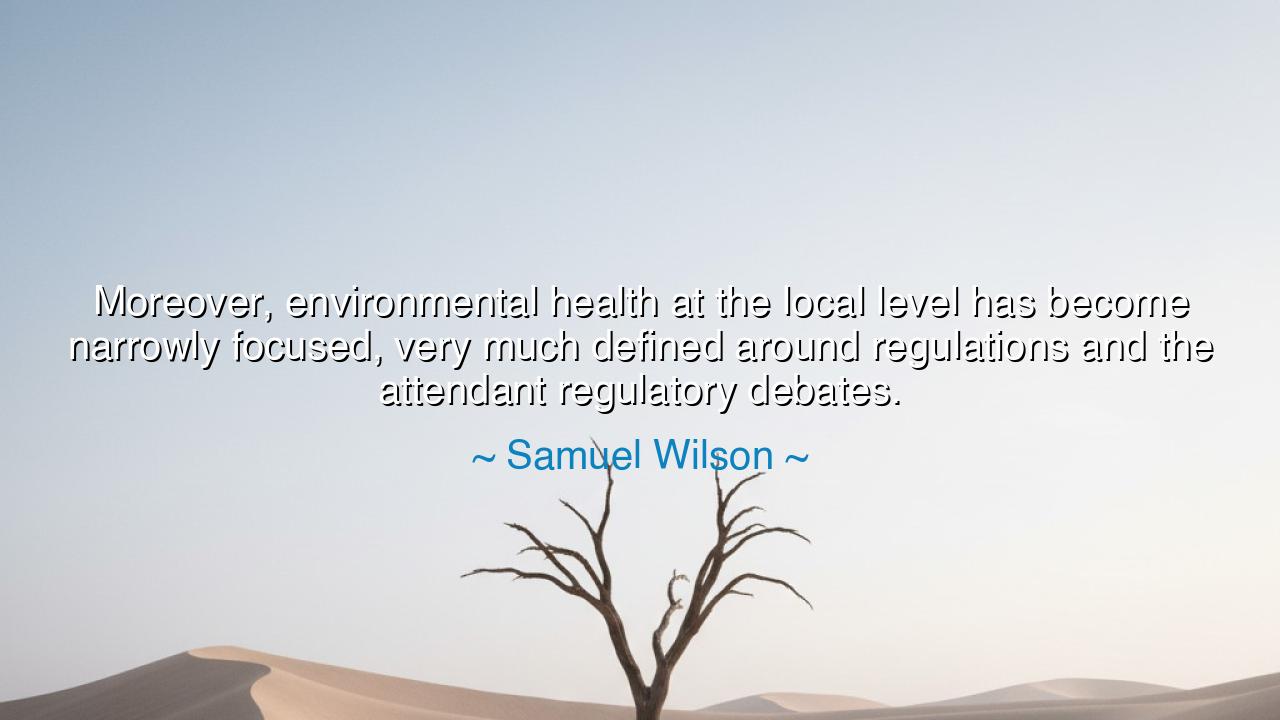
Moreover, environmental health at the local level has become
Moreover, environmental health at the local level has become narrowly focused, very much defined around regulations and the attendant regulatory debates.






Hear the words of Samuel Wilson, who declared with insight and sorrow: “Moreover, environmental health at the local level has become narrowly focused, very much defined around regulations and the attendant regulatory debates.” In this reflection lies the lament of a man who has seen the guardians of the earth become entangled in the snares of bureaucracy, where the spirit of protection is too often lost amidst argument, paperwork, and politics. His words do not reject regulations, for they are shields against harm, but he warns that when all care for the earth is reduced to mere debate and statute, the living heart of stewardship is forgotten.
In ancient times, before laws were carved upon tablets or codices, men and women cared for the land out of reverence and survival. Farmers rotated their crops, shepherds guarded against overgrazing, and villages shared water with mutual respect. They knew that the health of the environment was bound to their own breath and bread. Yet in the modern age, Wilson observes, this sacred relationship has been overshadowed by regulatory debates, where communities wrangle over codes and limits, forgetting that behind the letter of the law stands the flesh of their children, the waters they drink, and the air they breathe.
Consider the tale of Minamata in Japan. For years, fishermen and families suffered strange illnesses—tremors, blindness, even death. The cause was mercury dumped into the bay by industry. When the truth came forth, the response became ensnared in endless legal debates—compensation, responsibility, liability—while the people continued to suffer. The law moved slowly, the debates grew fierce, but the sea remained poisoned. Here we see the warning of Wilson made flesh: when the guardianship of health becomes trapped in endless regulation, the true purpose—healing and protection—is delayed or denied.
Yet Wilson’s words are not merely a condemnation; they are also a call. He reminds us that the work of environmental health is more than the crafting of rules—it is the tending of life itself. Laws are necessary, yes, for without them the powerful exploit and destroy. But laws must be animated by spirit, by the will of communities to act not only when the regulations demand it, but when conscience demands it. For the earth does not pause to wait for the outcome of a hearing, nor does a river hold back its poison until a committee reaches agreement. The urgency of life transcends the slowness of law.
The emotional essence of his teaching is this: protection must be alive, not mechanical. When debate becomes the end rather than the means, when lawyers and lobbyists replace farmers, mothers, and workers as the central voices, then the earth is left undefended. For true guardianship requires not only law but also love—a love that is fierce, practical, and immediate.
The lesson, O listener, is clear: respect regulations, but do not let them be the cage of your concern. Be vigilant not only when policy commands, but when your heart and reason see danger. If your well is tainted, act before the law catches up. If your children cough from the air, raise your voice beyond the courtroom. Justice delayed is life denied, and Wilson’s words call you to remember that health cannot wait for debate.
What then shall you do? First, awaken in yourself and your community a sense of direct responsibility for the environment, not as an abstract legal concept but as daily bread. Second, engage with laws and policies, but never mistake them for the fullness of stewardship—act beyond them when necessity calls. Third, demand from your leaders not only regulations, but swift and compassionate action that prioritizes lives over legal sparring.
And remember always: the earth is not saved by words on parchment, but by hands that plant trees, voices that demand justice, and hearts that refuse to let debate eclipse duty. In speaking thus, Samuel Wilson hands down a teaching to us all—that true environmental health is not a contest of regulations, but a covenant of life, written in soil, water, and sky.






AAdministratorAdministrator
Welcome, honored guests. Please leave a comment, we will respond soon